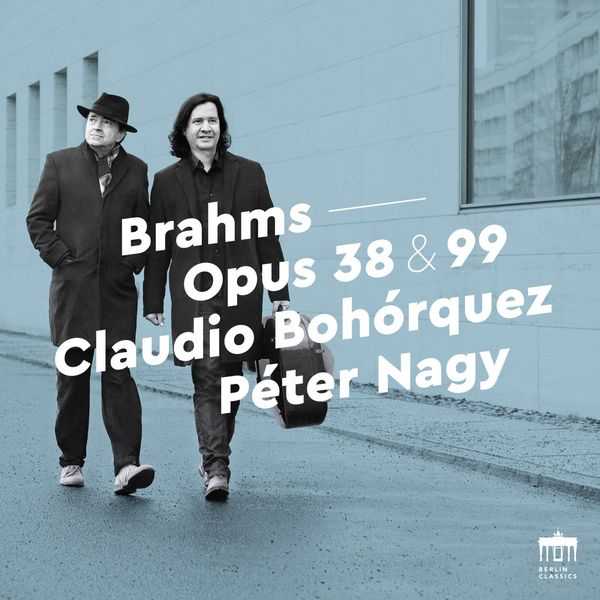

Composer: Johannes Brahms
Performer: Claudio Bohórquez, Péter Nagy
Format: FLAC (tracks)
Label: Berlin Classics
Catalogue: 0301097BC
Release: 2018
Size: 1.07 GB
Recovery: +3%
Scan: yes
Cello Sonata No. 1 In E Minor, Op. 38
01. I. Allegro non troppo
02. II. Allegretto quasi menuetto
03. III. Allegro
Cello Sonata No. 2 in F major, Op. 99
04. I. Allegro vivace
05. II. Adagio affettuoso
06. III. Allegro passionato
07. IV. Allegro molto
Hungarian Dances, WoO 1 Nos. 1-21
08. No. 5 in F-Sharp Minor
09. No. 1 in G Minor
10. No. 7 in A Major
Lieder, Op. 105
11. No. 1. Wie Melodien zieht es mir (arr. for cello and piano)
Claudio Bohórquez has established himself as an experienced chamber musician and concert soloist. For the past 30 years and more he has been playing the cello, teaching at the famous Hanns Eisler conservatoire in Berlin and travelling the world from the USA to Japan and from Argentina to Russia.
Now the moment has come for him to attend to his discography. “The time is right,” as he says. He learnt early on, from colleagues he trusted and admired, how important it was to take one’s time. No snap decisions – musical ideas needed to mature, interpretations had to be based on personal experience, and self-awareness was essential. He begins where he first started out. The Sonatas for piano and cello opp. 38 & 99 by Johannes Brahms loom large in the life of each and every cellist. Like others before and since, he tackled these works at an early age. In the Hungarian pianist Péter Nagy, he has found the perfect musical partner.
Brahms was especially fond of the cello: we know that from the countless themes, leading lines and heartfelt melodies that the composer entrusted to the instrument. In his youth, he had “played the fiddle a bit, but my instrument was the cello,” as Brahms told the Viennese music critic Herberger. The Hungarian Dances, serving as a foil – almost as an encore – to the two sonatas, were written at a time when Hungarian refugees were settling in Brahms’s native city of Hamburg. The demand from the aspiring middle classes for sophisticated but playable music, suitable for domestic performance, was one of the secrets of success for the Hungarian Dances. The arrangement by Alfredo Piatti is the currently preferred version for piano and cello. The musical starting signal has rung out. Claudio Bohórquez is not stopping at Brahms, he has much more to give us. It sounds good!
The German cellist – of Peruvian and Uruguayan descent – Claudio Bohórquez is one of the most in-demand soloists of our times. A student of Pergamentchikow, he quickly took to great competitions like the Moscow Tchaikovsky Competition or the Rostropovitch Competition in Paris, where he gave a good account of himself, before seizing first prize at the prestigious Geneva Competition, and above all the Casals First Prize, which launched his international career. It was a career which has seen him perform at the Dresden Staatskapelle, the Gewandhaus of Leipzig, the Vienna Symphonic, the Orchestre de Paris, and of Toulouse, and the Academy of St. Martin in the Fields. On the piano, Péter Nagy is a famous old hand, who in 1979 won the famous Hungarian Radio Competition, which opened many doors for him. A much sought-after chamber musician, he has been found alongside Miklós Perényi, Leonidas Kavakos, Kim Kashkashian, Nobuko Imai and Ruggiero Ricci. Here, our two friends have chosen a repertoire which is discographically well-represented, it’s true, but no-one will complain about this sumptuous music, sumptuously played. By way of a follow-up, we have three Hungarian Dances adapted by Alfredo Piatti, the “Paganini of the Cello”, according to Liszt, and the beautiful Lied Wie Melodien zieht es mir re-written for cello. It’s a beautiful recording, it must be said.